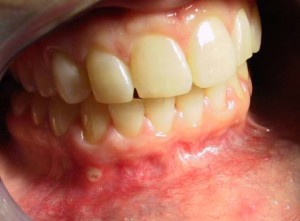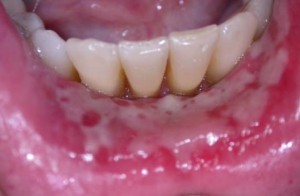Canker SoresCanker sores (recurrent aphthous stomatitis, RAS) are among the most common of oral conditions and are experienced by more than half of the population. These small, round or oval, painful yellowish sores often first appear in adolescence. They usually affect the softer parts of the mouth that move, such as the tongue, soft palate, cheeks, and lips. This condition is recurrent because these sores usually will heal on their own but then reappear in the same or new locations after a period of time. In some severe cases, old ulcers may be healing while new ones appear. There are three main forms: Minor Aphthous Stomatitis: this is the form that affects more than 80% of canker sore sufferers. The sores are usually small (less than 1 centimeter in diameter), heal in about a week, and do not cause scarring. Major Aphthous Stomatitis: this more severe form affects approximately 15% of patients with canker sores. These sores often last two weeks or more and are typically over 1 centimeter in diameter. They can be extremely painful and often heal with scarring. Herpetiform Aphthous Stomatitis: This form of the condition is uncommon, occurring in less than 5% of people with canker sores. They occur as clusters of very small ulcers (less than a millimeter in some cases) that sometimes merge together to form larger ulcers. They usually heal in just over one week. Most of the time, canker sores are self-limiting. This means that they will go away even without treatment. The cause of canker sores is not known. However, in some instances, they can be a sign of other conditions affecting the body (such as a gastrointestinal disease). Be sure to tell your doctor if you are experiencing fatigue, abdominal pain, fever, eye discomfort, or have rashes or sores on other parts of your body.
Q: Is the condition contagious? Did I catch it and can I give it to anyone else? Q: How can I tell the difference? Q: Then what causes canker sores? Q: How can I tell if my canker sores are related to an allergy or systemic condition? Q: Is there a cure for canker sores? Q: Can anything prevent them? Q: What about “canker sore toothpastes”? Q: When should I talk to my dentist about my Canker Sores? Q: I see many canker sore medicines in the store. Is one better than the other? Prepared by the AAOM Web Writing Group Spanish Translation - Traducción Español The information contained in this monograph is for educational purposes only. This information is not a substitute for professional medical advice, diagnosis, or treatment. If you have or suspect you may have a health concern, consult your professional health care provider. Reliance on any information provided in this monograph is solely at your own risk. |


